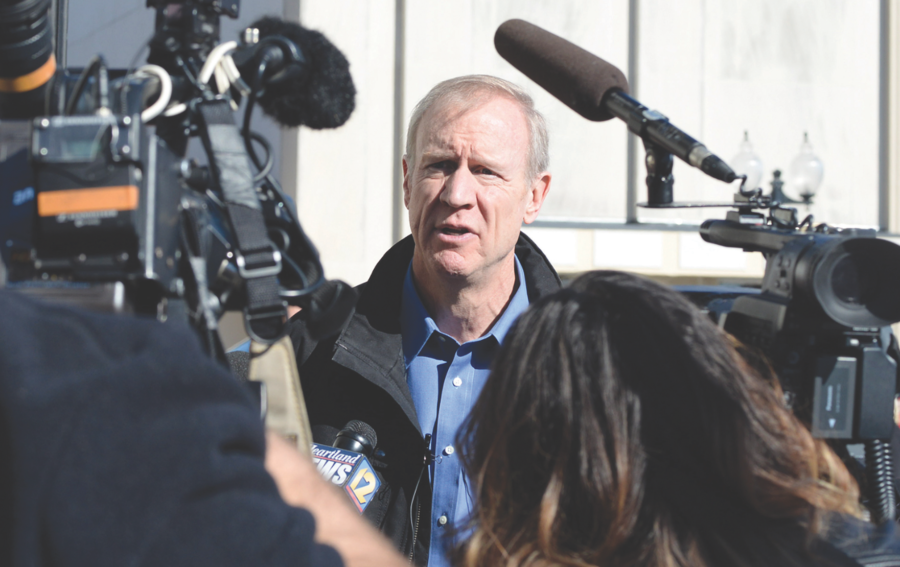Rauner strikes optimistic tone on ‘grand compromise’ with Democrats
April 28, 2016
Republican Gov. Bruce Rauner on Wednesday sought to strike an optimistic tone that a “grand compromise” with Democrats can be reached by May 31 to end the unprecedented budget impasse that’s threatened universities, caused havoc for groups that care for the vulnerable and led to a large stack of unpaid bills.
Whether Rauner’s optimism has a basis in reality was at best unclear, however.
Rauner said he is not backing away from the business-friendly, union-weakening agenda he says must be a part of a larger agreement. That wish list, which Rauner says will help the state’s economy rebound, remains a non-starter with Democrats who say it’ll hurt the middle class. The impasse has Illinois poised to end its current fiscal year without ever passing a full budget.
Advertisement
But it’s an election year, and both sides are trying to pin blame on the other for the mess at the Capitol. By broadcasting he’s open to a deal, Rauner is seeking to avoid blame as an obstructionist should an agreement remain elusive.
It’s not the first time Rauner has declared he’s “cautiously optimistic” about a pending deal. He said as much nearly a year ago, though those talks quickly fell apart. His optimism has since wavered depending on whether he’s in attack mode.
Rauner offered his latest take on the budget situation Wednesday after speaking at a high school in Auburn, south of Springfield. It was the first time Rauner has been out publicly taking reporters’ questions since Democrats and Republicans last week approved legislation to spend $600 million to keep the lights on at universities and community colleges.
The first-term governor said he’s encouraged by talks among rank-and-file lawmakers, saying the stopgap measure they engineered for higher education was “a very small initial step in the right direction.”
Rauner said he wants a two-year budget that would provide more money for universities and colleges and support for social service programs that have gone without state assistance since last July.
“My hope, my strong belief is that the right answer is not necessarily to do another short-term crisis bridge like we did on higher ed, but to move expeditiously in the next couple weeks to a grand compromise,” Rauner told reporters. “Reforms, revenues, spending reductions as part of a grand solution for [this year and next year] simultaneously. That would be better. And I think it’s doable.”
During his time in office, Rauner repeatedly has blamed Democrats, specifically House Speaker Michael Madigan, for standing in the way of a broader deal in an effort to build pressure for a tax increase.
Advertisement*
On Wednesday, Rauner credited pressure of another kind, namely the possible closure of Chicago State University, as the reason Democrats and Republicans suddenly saw eye-to-eye on higher education funding.
“The reality is, elected officials respond to pressure. And this is pressure,” Rauner said. “This is a crisis. And that definitely focuses the mind, for sure.”
A Madigan spokesman noted the higher education deal got done without Rauner insisting it be coupled with items from his reform agenda.
“I think the evidence continues to show that when you don’t force these non-budget issues, you make good progress, so we will continue to work along those guidelines,” said spokesman Steve Brown.
Brown added lawmakers have already voted on many of the governor’s proposals, roll calls Republicans said were a sham because they did not accurately reflect what Rauner wanted.
“We took plenty of action on things that he had on his list, one way or another. And if he would just recognize that, we could have had most of this in place more than a year ago,” Brown said. “Instead, we are where we are.”
The governor’s list includes limiting collective bargaining rights, curbing compensation costs for workers hurt on the job and putting restrictions on big-dollar lawsuits. Democrats say the changes are unrelated to the budget and would undermine middle-class workers.
Rauner dismissed what he called the political “back and forth,” saying he’s more focused on getting something done before June 1, when it will take more votes to pass legislation. Rauner said he wants to avoid calling lawmakers back for a special session on the budget over the summer, but said he’s looking into whether he can pay for the costs himself if need be.
The governor previously has dismissed the effectiveness of forcing lawmakers to Springfield without an agreement, saying it’s a waste of taxpayer money.
“The real goal is to come up with compromises by the end of May,” Rauner said.
“I’ve been watching as members in the General Assembly have been meeting. I’m not privy to all their conversations, I have not personally attended all the meetings,” Rauner said. “But I hear reports, I hear rumors, I hear some feedback from members of the General Assembly. And I am seeing more excitement and more optimism within the rank and file saying ‘You know, this has gone on too long. Everybody is going to have to come off their positions, and some of their hardest positions, and come up with some middle ground.’ I’m hearing that on a level I haven’t heard before. And so that makes me optimistic.”
A spokesman for Senate President John Cullerton also expressed hope about the renewed talks.
“Hopefully they will continue, because they need to continue,” Cullerton spokesman John Patterson said. “We’re going to have to work together if a solution is going to be found.”
___
(c)2016 the Chicago Tribune
Visit the Chicago Tribune at www.chicagotribune.com
Distributed by Tribune Content Agency, LLC.
Advertisement









